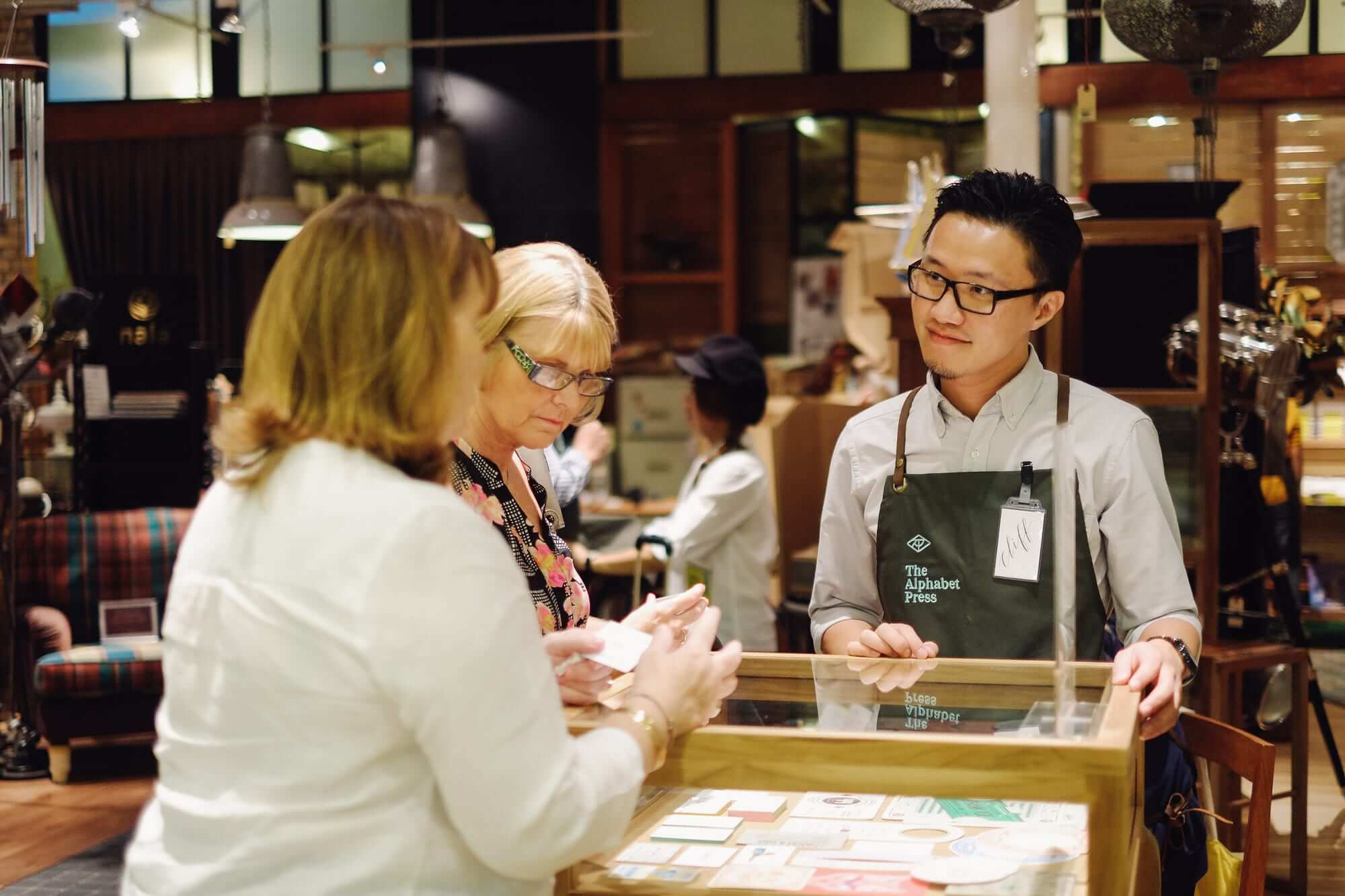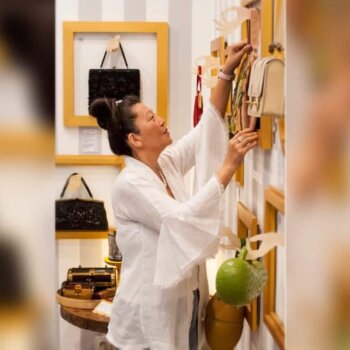Front lining The Alphabet Press is its Co-Founder and Brand Strategist, Cliff Leong with his firm handshake that is as welcoming as the letterpress experience is with the company itself. Driven by the notion of pursuit and the people that administer these energy into motion, he charts the team’s efforts to project their collective ambition, which is to be the bespoke letterpress stationery company that Malaysia enjoys.
Cliff previously toiled to build his co-owned web design company with best of friends since 2006. He then formulated the idea for The Alphabet Press, an innovative revival of a letterpress printing business in the 21st century.’ The Alphabet Press has since garnered much traction and media attention for its approach towards letterpress printing as well as its business model.
Cliff speaks to The Asian Entrepreneur today about the business he started.
In your own words what is The Alphabet Press?
It is sad how readily printers are these days to let go of the art of letterpress printing, which have long served us well, in exchange for the emergence of offset and digital printing in the new millennium. Many of these stories, craftsmen’s skills, and old printing machines & tools will be lost if no one is to do something about it.
The Alphabet Press began the journey with a purpose — It is to preserve, revive the centuries-old craft of letterpress, and to make it relevant again in the modern society by making it a sustainable business.
Challenged by limited resources, we sought to preserve the heritage, instead of leaving the collection of printing tools & presses in Malaysia to be unused and eventually, forgotten. We know something has to be done before all the lead types are dumped or sold as scrap metal.
We constantly educate the public about design responsibility, the printing process and the source of our materials (papers) which is 100% cotton, tree-free, and FSC-certified papers. During events, we bring the printing process to the public with live demonstrations, hands-on experience of making prints.
We hope that more people will learn the history of letterpress printing in Malaysia, through products that we designed and produced, and that’s how we make traditional craft more accessible to more people.
As of today, The Alphabet Press (TAP) is contemporary letterpress stationer that is pioneering the letterpress print renaissance in Malaysia. We enjoy making beautiful paper stationeries and with a mission to revive and spread the love of letterpress.
How did you come up with the idea of The Alphabet Press?
I was trained as a web developer and it was my profession for eight years, before I got into the letterpress printing business. Same goes to my three co-founders, where both Zeejay (our Printmaker) & Fidella (Design Principal) was web designer while Helios (Lead Innovation) was a commercial photographer. Shifting from high speed digital works to something that seems to be technologically backward, was truly a transition. I am now a full-time Brand Strategist at The Alphabet Press and I enjoy creating products that are made with our own hands, and see the products bring joy to other people.
Three years ago, we were a web design company who set out to look for something special for our business cards. We believe that the first impression is very important because it translates the taste or works we do as a designer through our own stationery. We have been looking for printing technique such as letterpress in Malaysia, but we lacked the knowledge and resources. And because of the curiosity on why isn’t there anyone doing it here locally? We decided to fly all the way to Melbourne to learn the craft itself from Carolyn of Idlewild Press. Since then, intrigued is an understatement to how at awe we are of the attention to details that goes into letterpress printing. I believe it happened by chance and curiosity.
Did you encounter any particular difficulties during startup?
Letterpress was a sunset industry, both locally and internationally. Surely, the craftsmanship itself has sufficient substance to withstand the test of time. We have faced many challenges when we first started but out of all, there are two that are significant.
First up — the lack of resources in Malaysia for the craft we’re venturing into. Materials like cotton papers, printing tools, and the rubber-based inks were imported from different countries namely U.S., Japan, & Australia. And so, when you have to get all the required tools in order just to make sure our production is up & running, the cost of running the business is much higher.
Secondly — many people may not have heard of the craft of letterpress in Malaysia. It almost seem like there is no demand in Malaysia because no one is doing what we’re trying to do — preserve, revive & make it relevant again into the modern society. But we know, education is key to sustain the craftsmanship.
Since opening doors, we have conducted various types of public events that are primarily focussed on educating our audience about the centuries-old craft of letterpress. During the events, we conduct live demonstrations and hands-on experiences for our audience to understand the origin of printing and the importance of keeping this quality craftsmanship alive. All these initiatives have been conducted with the leverage of other creative platforms, such as Kinokuniya Malaysia and Sundays which was formerly located at Bangsar Village 2. These public events have created the opportunity for us to introduce this craft to the mass, and the response has been absolutely encouraging.
How have you been developing The Alphabet Press since startup?
Our services are distinctly divided into two: Off-the-shelf products and bespoke letterpress services. We aim to engage with our audience for both. From the designs of our off-the-shelf products to our online retail site, we have always focussed on creating visual and textual contents that are engaging.
At present, we only operate from our online retail site (www.thealphabetpress.com) with heavy reliance on social media arms to engage. Coming from web designing backgrounds, we understand the importance of genuine contents that can inspire. This is why our online retail strategy is to engage with interactive contents that people can easily relate to and also be inspired.
As for our bespoke services, our engagement leans more towards educating and sharing all the know-hows that we have on hand about the letterpress processes. For every project that we carry on-board, we offer one-to-one consultations to understand the needs and expectations of our customers. This is to tailor the letterpress experience as fitting as it could be for each and every one of them.
Clearly, the direction for both our services are people-oriented and to take the experience to greater heights, we are hoping to introduce more customisation experience in our upcoming retail store. Through customisation and personalisation, we are able to create fully-customised products that would involve our customers in the creation process.
Retail strategies can be dry and methodical. However, we strategize our time and efforts into engaging with customers because it is equally a retail strategy as much as it is a sustainable investment into our branding.
What kind of feedback did you get for The Alphabet Press so far?
I’m quite thankful on the responses received so far. Our customers like our produces and the quality of a letterpress print, which helps to translate the messages or personalities of the person. They share with us how it helps to impress the people he or she met by exchanging business cards. A business card is the first impression of your brand.
Do you face a lot of competition in this industry?
Believe it or not, competition exists in every field. But, it’s a good thing. It pushes you. And that’s when you’ll start thinking about competitive advantages. In our case, it may not yet be a stiff competition in Malaysia because of its niche market and high entry barriers (the skills & craftsmanship).
We strategize our time and efforts into engaging with customers. We believe that good customer experience comes from sincerity and that we genuinely want to give each and every customer a good experience.
With our off-the-shelf online retail store, we ensure that the products are delivered as illustrated and described. The worst kind of online retail experience is to receive products that are unmatched to the expectations that it projects on its online retail site. In any form of unforeseen unfortunate events, we also do take responsibilities where seen fit as we want to address dissatisfaction and take proactive actions to resolve any issues.
With more customer contact on the bespoke services side of things, we are able to provide a more elaborated customer experience. Before any project takes off, we ensure that customers are equipped with all the information that they need to make the right and just decisions to order their personalised stationery. As and when we need to make suggestions and advice, we spend time on asking the right questions and listen to what their needs are. This is so that we are able to add value to what they want as the end product.
Do you think that this traditional practice of letter pressing will remain relevant in the distant future?
Letterpress revolutionised the world by first mass producing books and written materials that are now made easily available today. It dates back to 1450 with the ingenious invention of printing press and moveable type by Johannes Gutenberg. Back then, for every single word you see on a book, each letter was manually typeset and positioned by a different wooden carving or lead casting. The paper would be carefully placed on top of the type and pressure was then applied to create a beautiful ‘kiss’ impression known as letterpress.
Fast-forward to today, it has evolved into an art form more than a standard printing practice when deep impression was discovered. It’s the bite on paper that saved letterpress. But in the beginning of the 19th century, there were other forms of printing that was able to ‘kiss’ on paper mode gently and efficiently. Thereafter, letterpress lost its popularity and letterpress machines were used less and less, nearly obsolete. In 1980s, letterpress was then revived by a group of people who appreciated the tactile feeling and craftsmanship of letterpress in which has made a great impression in them. They needed something distinct and unique to set letterpress works apart, and that is how the beauty of the bite was resurrected letterpress.
I believe that this traditional printing technique of letterpress is more humane than the commercial printing techniques, which solely rely on fast output and lower pricing strategy. Although letterpress is a labour-intensive printing process but the quality of the end product (the print) is something that set itself apart from the modern offset and digital printing. It has stood in time and will continue to do so.
How do you plan to stay relevant in this industry?
With the rise of digital era, it’s undoubtedly the print industry has been affected. But I see the potential on how print is evolving to be of a higher value with better quality and content. At the moment, we’re the only contemporary letterpress stationer in Malaysia.
I think what we set us apart is that we’re driven by making craftsmanship more accessible and to reach out to more people. That’s why we’re constantly introducing personalisation services into our products. We engage with our customers and invite them to be a part of the process of creation. It gets so personalised and only through experience you can appreciate its value.
I believe this will be the future of manufacturing.
Were there anything that disappointed you initially?
Nothing much, except a lack of appreciation for design, process, quality and all those wonderful things that enhance the value of a good product. It’s generally very much lacking in Malaysia. But the good thing is, we’re living in vastly connected world. Believe it or not, we’re almost laughing at the same jokes, eating the same foods and driving the same cars. It’s becoming easier and easier to market a certain product to almost everyone on the planet. I believe we can design here, build here, and sell everywhere.
What do you think about being an entrepreneur in Asia?
Having multiple jobs or running several businesses at one time may be the most unique characteristic of entrepreneur in Asia. And this diversification often helps to reduce risks and gives a better insight into multiple industries, which allows innovation and sometimes connecting the dots.
What is your opinion on Asian entrepreneurship vs Western entrepreneurship?
There are cultural differences on Asian entrepreneurship vs Western entrepreneurship. Family values are deeply rooted in Asian society and it is being reflected on many business practices while Western practices seem to be more pragmatic. Many Asian entrepreneurs tend to start their business earlier at young age, and rely more heavily on the support from family and friends, both the financial and business guidance. There is no wrong way and it will be different to each person, to each industry, and even to each point in time.
What is your definition of success?
In my opinion, success doesn’t lie in just one thing, it’s when you give your best in everything you do and you love, that’s where you get your success every day in the heart.
What was the tipping point when you decided one day to become an entrepreneur?
When I started to look for a sense of accomplishment and find that it’s hard for me to fit into the corporate world. I kept questioning myself for a larger sense of purpose regarding what my time and effort is going into every day.
In your opinion, what are the keys to entrepreneurial success?
Personal Integrity. I think that one’s personal integrity actually reflects a lot about the business because it highly determines the values that are upheld by the organisation. An entrepreneur must preserve his or her personal integrity through good and bad times. I believe that personal integrity is the measure of who a person really is; be it via actions, how he or she embodies beliefs, and how a person carries vision and mission to fruition.
Any parting words of wisdom for entrepreneurs out there from your personal experience?
Don’t do it! Don’t do it unless you’re absolutely ready to commit your lifestyle, time, and effort into running your own business. This is because entrepreneurship reflects that kind of tenacity to sustain, at least for the initial stages. You have to be fiercely responsible to your business. It’s almost like a marriage – don’t do it unless you’re ready and willing to commit into it fully and responsibly. Of course, you’ll truly taste the sweetness of your hard work when the fruits are ready to be reaped.
Connect


































